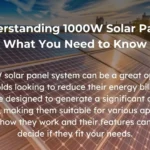Solar power is popular as a green and ecologically friendly alternative to traditional energy sources. As more people and businesses choose solar power, a recurring issue occurs.
Is the initial cost of the Solar system truly justified by the long-term savings?
Let’s crunch the numbers and shed light on this burning question. From the initial cost of the Solar system to potential savings, we’ll explore how solar power in Pakistan isn’t just about going green, it’s about putting more green in your wallet over the long haul.
Understanding the Costs
Initial Investment
The initial cost of the Solar system is often seen as an obstacle. But understanding what goes into this initial investment can help clarify the process.
- Solar Panels:These are the most important and expensive components of any solar power system. The price varies depending on the type and performance of the panels but in Pakistan you can expect to pay between PKR 40000 to PKR 80000 per panel.
- Inverter: The inverter is important to convert the generated DC current into AC electricity that we can use in our home or business. Inverters in Pakistan cost between 60,000 and 150,000 Pakistani rupees depending on the size and brand of the system.
- Batteries: These are not always necessary, but they do store surplus energy for use during non-sunny months. Batteries can cost anywhere from 200000 and 500000 Pakistani rupees.
- Installation: Professional installation is essential for your system to work efficiently. Installation fees typically range from PKR 50000 to PKR 100000.
- Permits and Fees: Depending on your location you may need to get a permission adding another PKR 10000 to PKR 20000 to the cost.
The average cost of the solar system in Pakistan can range from PKR 500000 to PKR 1500000 depending on the size and difficulty of the setup. Additionally government grants and incentives may be available lowering the overall price.
Ongoing Costs
While the starting cost of the Solar system is high, continuous costs are low contributing to the long-term savings possibility.
- Maintenance and Cleaning: Solar panels require minimal care mainly regular cleaning to remove dust. Annual care costs are generally around PKR 5000 to PKR 10000.
- Inverter and Battery Replacement: Inverters typically stay 10 to 15 years and batteries may need to replace every 5 to 10 years. Replacing these parts can cost anywhere from PKR 100000 to PKR 300000 depending on the system size.
- Insurance Considerations: Insuring your solar energy system can provide peace of mind. Cost of the Solar system insurance varies but generally falls between PKR 5000 to PKR 15000 annually.
Potential Savings
Reduced Electricity Bills
One of the most important reasons to invest in solar energy is the potential to greatly decrease or even stop your electricity bills.
- Average Electricity Costs in Pakistan: The average home in Pakistan spends around PKR 10000 to PKR 30000 monthly on electricity depending on usage and location.
- Potential Savings: A well sized solar energy system can cover 50% to 100% of your electricity leading to significant savings. For example if your monthly bill is PKR 20000 a solar system could save you PKR 240000 annually.
- Seasonal Variations: Solar energy production is highest during the summer when electricity consumption is also high. This alignment can maximize your savings.
Net Metering Benefits
Net metering is a system that allows you to sell extra electricity generated by your solar panels back to the grid further improving your savings.
- How Net Metering Works in Pakistan: When your solar panels produce more electricity than you need the extra electricity can be sold to the grid and you receive credits on your electricity bill. Over time these credits can greatly reduce your costs.
- Potential Income Generation: In some cases your solar energy system could produce sufficient, excess electricity that you not only eliminate your bill but also yield income.
Long Term Savings
The long term savings associated with solar energy can be important, making the initial investment worthwhile.
- Payback Period: The payback period is the time it takes for your solar energy system to pay for itself through savings on your electricity bills. In Pakistan the average payback period ranges from 5 to 7 years depending on system size and electricity costs.
- Total Savings Over System Lifespan: Solar panels typically last 25 to 30 years. Your total savings over the system’s lifespan could easily exceed PKR 4000000 depending on electricity rates and system efficiency.
Factors Affecting Cost and Savings
Solar Radiation
Amount of sunlight received at a location directly impacts the performance and savings of a solar energy system.
- Pakistan’s Solar Resource: Pakistan has an excellent solar resource with average solar radiation ranging from 5 to 7 kWh/m²/day. This high level of sunlight helps the solar panels to work efficiently.
- Regional Variations: However there are regional differences. For example areas in Sindh and Balochistan receive more sunlight compared to northern regions potentially leading to higher energy production and greater protection in these areas.
System Size and Efficiency
The size and efficiency of your solar energy system play an important role in determining both the cost of Solar system and the potential savings.
- System Size and Cost: Larger systems can generate more electricity leading to higher savings but also higher initial costs. It’s essential to size your system correctly based on your electricity needs and budget.
- Panel Efficiency: The efficiency of the solar panels you choose also affects the overall performance. Higher efficiency panels may have a higher upfront cost but can generate more electricity in a smaller space optimizing savings.
Financing Options
Financing options can make the cost of the Solar system more manageable allowing more households and businesses to invest in solar power.
- Available Financing Options: In Pakistan various financing options are available including loans. Banks and financial institutions offer solar specific loans with favorable terms.
- Impact of Interest Rates: The interest rate on your loan will impact the overall cost of your solar energy system. Lower interest rates can make financing more attractive and reduce the payback period and enhance savings.
Perspectives on Solar Energy Costs
Consumer Mindset
From a consumer view the cost of the Solar system should be viewed as a long term investment.
- Long Term Savings: The potential to save hundreds of thousands of rupees over the system lifespan makes solar energy an attractive option for many consumers.
- Decision Factors: Factors such as the availability of sunlight electricity costs and financing options should all be considered when deciding to invest in solar energy.
Government Perspective
Government policies play a significant role in making solar energy more accessible and affordable.
- Promotion of Solar Energy: The Pakistani government has introduced various policies to promote solar energy including net metering and subsidies.
- Impact of Subsidies and Incentives: These initiatives can greatly reduce the initial investment required making solar energy more affordable for a wider range of consumers.
Installing a solar system is a unique investment that offers many advantages over conventional electricity. The biggest advantage of solar energy is that it is always available, so you don’t have to worry about constant power outages. Don’t wait any longer, contact Al Arz today! They will guide you through the entire process from the initial cost of the Solar system and help you to install your solar system.
Drawbacks of Solar Energy (Cost Related)
While the cost of the Solar system offers considerable potential savings it is essential to consider the drawbacks.
- Upfront Investment: The initial investment is important and may be a barrier for many consumers even with financing options and support.
- Dependence on Weather: Solar energy depends on weather conditions. Cloudy or rainy days can lower electricity production directly impact savings.
Conclusion
The cost of the Solar system in Pakistan is a one-time expenditure that can result in significant savings over time. While the initial investment may appear exorbitant, the long-term benefits, including lower power bills, net metering revenue, and government subsidies, make solar energy a good financial decision for many homeowners and companies.
FAQ’s
What is the average cost of the Solar system in Pakistan?
The average cost of the Solar system in Pakistan ranges from PKR 500,000 to PKR 1,500,000, depending on factors like system size, installation complexity, and government incentives.
What are the main components of a solar system and their approximate costs?
The main components are solar panels, inverter, batteries (optional), installation, permits, and fees. Prices vary, but estimates include PKR 40,000-80,000 per panel, PKR 60,000-150,000 for the inverter, PKR 200,000-500,000 for batteries, PKR 50,000-100,000 for installation, and PKR 10,000-20,000 for permits and fees.
How long does it take for a solar system to pay for itself?
The payback period for a solar system in Pakistan typically ranges from 5 to 7 years, depending on factors like electricity costs, system size, and government incentives.









